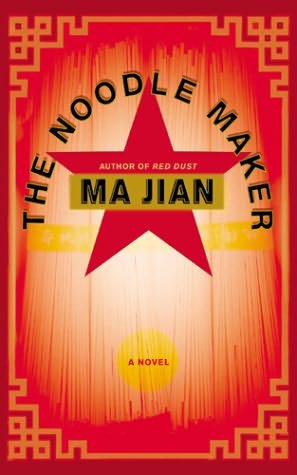Book Review: China’s Surreal Corruption
A new novel by a Chinese dissident provides a comically stinging vision of his homeland.
The Noodle Maker, by Ma Jian. Translated from the Chinese by Flora Drew. (FSG)
By Tess Lewis
The pace of social and economic change in China has accelerated to such a degree that history hasn’t had time to repeat itself either as tragedy or as farce. Still, at great personal risk, expatriate Chinese artist and dissident Ma Jian offers penetrating looks at the seismic convulsions his country is undergoing from the bottom up. His novel The Noodle Maker is an antic romp through the dregs of a society caught between totalitarian politics and the blandishments of Western materialism. Ma’s vision of his former homeland may be unremittingly bleak, but he spices it with just enough humor and absurdity to keep the reader afloat on his tide of despair.
Before his escape to the West, Ma Jian had been particularly well-placed to calibrate the gaps between the Communist Party’s version of reality and life on the streets. The writer had worked for a time as a photojournalist in the propaganda department of China’s Federation of Trade Unions. Convicted of “spiritual pollution” in the early 1980s, he was unemployed, unemployable, and shunned by former friends and colleagues. So he set off on a three-year tour of his country armed with little more than forged travel documents. Jian’s account of his journey, Red Dust, is not as bleak as The Noodle Maker, but offers an unsparingly candid portrait of the desperate poverty and squalor in which many of his countrymen live.
In 1983, when Jian wrote Red Dust, the Cultural Revolution had been over for 7 years and the economic reforms initiated by Deng Xiaoping’s Open Door Policy were rapidly transforming the country. Nonetheless, criticism of the government was still a severe offense. Ma left for Hong Kong and then London, where he now lives. In China, the government has banned his travelogue as well as his gleefully macabre and cynically satirical fiction. The government’s objection to Ma’s brand of socialist surrealism is understandable. Still, after decades of official mendacity, the very extravagance of the social critiques in Ma’s fiction, his pathologically unvarnished version of the truth, is cathartic.
Post-Tiananmen Square China, as Ma portrays it in The Noodle Maker, is worse than a dog-eat-dog world. In fact, the most humane character in the book is a talking three-legged dog. (The dog is not crippled, but deformed; the third leg sprouts from the middle of its chest.) Human relationships are governed by suspicion, greed, resentment, and exploitation. An actress stages her suicide as a theatrical event to get her neglectful lover’s attention. The entrepreneur of a thriving private crematorium convinces his mother to let him incinerate her. A father tries repeatedly to abandon his handicapped daughter in order to circumvent the One Child Policy, but grows increasingly dependent upon her with each attempt.
We learn the fates of these predators and prey through Comrade Sheng, a professional writer placed on probation by the Writer’s Association because his propaganda has been judged politically ambiguous. Sheng struggles to find a foothold in the spiritual vacuum that surrounds him by creating a fictional world that is more real to him than the actual one. He sees himself as a noodle maker, kneading his characters like lumps of dough and pulling them into thousands of tangled threads.
The nine intertwined stories that make up this novel are precisely the ones Sheng lacks the courage to publish. They are about the people he knows, those he sees on the street with “lives as miserable and constricted as his own.” This is, of course, not what the Premier meant with his admonishment to “Seek the truth from the facts.” So the writer contents himself with telling his stories to his friend, a professional blood donor, in exchange for a weekly meal.
The friends first met during the Cultural Revolution at a re-education camp where they had been sent, as “urban youths,” to “learn from the peasants.” They returned to Beijing with few prospects. The writer scratches out a living struggling to balance his conscience with Party dictates. The blood donor, on the other hand, has opted for crass materialism. Besides enormous bribes, he receives three times the writer’s monthly salary for each illicit blood donation he gives to help factories fill their donation quotas.
“You mystify life, so that you can rationalize your loss of grip on reality,” he chides the writer. “You’ve forgotten that man survives through his quest for profit, not truth. Without the profit motive, we would all be finished.” The profit motive dominates this novel littered with such “ultimate signs of success” as wallpaper, televisions, jars of Nescafe, perfumed soap, tapes of unwholesome songs banned by the Party, and pictures of women whose breasts exceed the maximum cup-size allowed by the Open Door Policy’s poster regulations.
Predictably, the trappings of success offer no real satisfaction. The donor returns, week after week, to hear what the agonized writer has to say. For decades, after all, a grip on reality has been a relative thing. It is one of the few heartening ironies in Ma’s compelling satire that in the midst of propaganda and marketing babble, people still turn to fiction for precious glimpses of harsh truths.
Tess Lewis is an essayist and translator from French and German. Her translations of the Swiss poet Philippe Jaccottet’s Seedtime: Notebooks 1954-79 was published recently by Seagull Books. She is curator of the 2014 Festival Neue Literatur.

